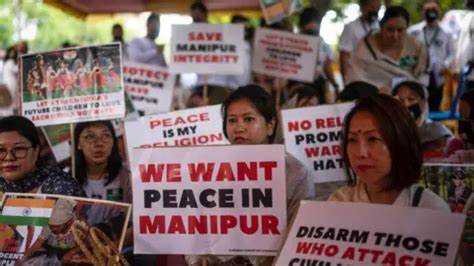– Mohd Naushad Khan
For the past year, Manipur has been engulfed in a relentless cycle of violence, leaving communities fractured and lives lost. This turmoil, fueled by a mix of ethnic tensions, political discord, and economic grievances, has inflicted profound suffering on the people of Manipur. As we reflect on the events of the past year, it is crucial to delve into the root causes of the violence and strive for enduring solutions that promote justice, peace, and reconciliation.
Manipur stands as a melting pot of diverse cultures, each with its unique identity and aspirations, yet intertwined in a complex tapestry of historical and contemporary tensions. Land disputes, resource allocation issues, and political representation struggles have brewed discontent among the state’s various communities over the years.
The recent surge in violence has seen clashes erupting between ethnic groups and between civilians and security forces, resulting in tragic loss of lives, displacement of families, and pervasive fear and mistrust among communities. These conflicts stem from a multitude of factors, ranging from historical grievances to present-day socio-economic challenges.
The ramifications of the violence extend far beyond the immediate victims, deeply impacting society and the economy. Infrastructure lies in ruins, livelihoods are disrupted, and development endeavors are stymied. Moreover, the psychological toll of living amidst fear and uncertainty cannot be overstated.
A poignant documentary titled ‘Manipur – a Blot on Indian Democracy’ has shed light on the distressing state of affairs in Manipur, portraying a democracy paralyzed by prolonged turmoil, to the detriment of its 3.7 million inhabitants, irrespective of ethnic divides. Journalist Anto Akkara, the documentary’s producer, lamented the prolonged anguish, questioning the essence of democracy amidst rampant chaos.
The absence of firm government intervention has exacerbated the crisis, prompting concerns about the erosion of democratic principles. Despite appeals for restoration of law and order and peace in Manipur, the silence from the nation’s leadership, notably Prime Minister Narendra Modi, has been deafening, leaving citizens dismayed and perplexed.
Public figures, such as Michael Williams, president of the United Christians Forum, and Anastasia Gill, a former member of the Delhi Minority Commission, have voiced condemnation and expressed solidarity with the suffering populace, highlighting the urgent need for collective action to address the underlying issues plaguing Manipur.
Amidst the complexity of the situation, there remains hope for a peaceful resolution. Acknowledging and addressing the grievances of all stakeholders is paramount, necessitating genuine dialogue and inclusive decision-making processes. Initiatives such as community forums, peace talks, and truth and reconciliation commissions offer avenues for healing and understanding.
Comprehensive peacebuilding efforts, encompassing inclusive development and governance, are essential to address the root causes of the conflict and foster lasting stability. It is incumbent upon both state and central governments to prioritize peacebuilding initiatives, investing in infrastructure, education, healthcare, and promoting inclusive governance structures.
In conclusion, as we commemorate one year of violence in Manipur, it serves as a poignant reminder of the imperative for peace and reconciliation. Breaking the cycle of violence demands concerted efforts from all quarters – political leaders, civil society organizations, community leaders, and citizens – to pave the path towards a more harmonious and prosperous future for Manipur.




